Politics
/ArcaMax

Michael Hiltzik: With 'Alligator Alcatraz,' Trump and DeSantis define their immigration policy as a tragic farce
Just as you may have thought that it was finally safe to think about American politics without thinking about Florida's Republican governor, Ron DeSantis, he has slinked his way into the national news again.
The occasion was a tour he hosted Tuesday for Donald Trump and Homeland Security Secretary Kristi Noem of what has become known as "...Read more
Jackie Calmes: In the halls of Congress and on the canals of Venice, the new Gilded Age has a moment
The juxtaposition at the weekend was apt: one big, ugly bill in Washington and one big, garish wedding in Venice.
This is what days of Senate debate over President Trump and Republicans' nearly 1,000-page legislation had in common with the days of revelry at the $50-million nuptials of the world's-third-richest-man, Jeff Bezos, and ever-couture...Read more

David M. Drucker: Mamdani's rise is a gift Republicans are already using
Zohran Mamdani isn’t the most famous Democrat in America. But the frontrunner to serve as New York’s next mayor is well on his way — and he’ll get there, if Republicans have anything to say about it.
Immediately after the previously little-known state assemblyman from Queens won the Democratic nomination for mayor, stunning his party’...Read more
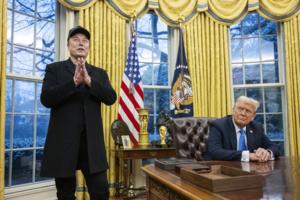
Anita Chabria: Elon Musk learns that bullies aren't your friends. Now what?
The thing about bullies is they don't have real friends.
They have lieutenants, followers and victims — sometimes all three rolled into one.
Most of us learn this by about third grade, when parents and hard knocks teach us how to figure out whom you can trust, and who will eat you for lunch.
Elon Musk, at age 54 with $400 billion in the ...Read more

Allison Schrager: America's broken politics is breaking economics, too
The political realignment has come for economics. At least since the days of Friedrich Hayek and John Maynard Keynes in the last century, the divide in economic thinking roughly corresponded to the political split. In the mainstream, everyone was a capitalist and saw some role for government. The right/left divide was mostly over exactly how big...Read more

Commentary: In a democracy, protest is good for the soul, even if it does not change anyone's mind
For the last several months, I have organized a weekly “Stand-Up for Democracy” rally/protest on the busiest street corner in my hometown. On Fridays at 5:30 pm., students, teachers, townspeople, and senior citizens come together, hold signs, and wave at passing drivers, some of whom honk their horns in solidarity.
I live in a very ...Read more

Gustavo Arellano: Trump was winning with Latinos. Now, his cruelty is derailing him
The Pew Research Center is one of the most trusted polling firms in the country, especially when it comes to Latinos. Last week, it published findings that should have been a victory lap for Donald Trump and his tortuous relationship with America's largest minority.
According to Pew, Trump won 48% of Latino voters in the 2024 presidential ...Read more

Commentary: I tried this new abomination at Whole Foods so you don't have to
I love pickles. Dill pickles, kosher dill pickles, cornichons, full-sour pickles, half-sour pickles, quarter-sour pickles, quick pickles, gherkins, German senfgurken. Not bread and butter pickles. Those are not pickles. The flaccid, round slices with their fluorescent yellow tint and sickeningly sweet flavor are a disgrace to the pickle name.
I...Read more
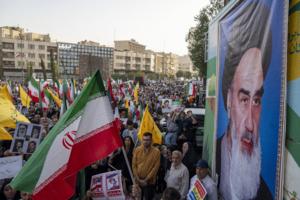
Martin Schram: Peace through power – It's electric!
For several hold-your-breath weeks, as spring sizzled into summer, the nuclear dealmakers of President Donald Trump’s USA and the Supreme Leader Ayatollah Ali Khamenei’s Iran seemed astonishingly close to a deal.
So close that it seemed they’d soon reach out and seize the deal. But no one was willing to reach out.
First, on May 13, Iran�...Read more
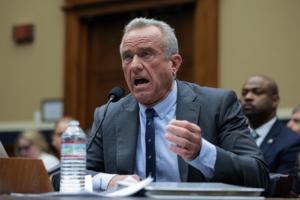
Lisa Jarvis: RFK Jr.'s vaccine panel is turning misinformation into policy
Health and Human Services Secretary Robert F. Kennedy’s dismantling of Americans’ trust in — and ultimately, access to — vaccines isn’t happening with one sweeping policy that grabs the public’s attention. It’s unfolding quickly and quietly, in bland conference rooms where hand-picked appointees make decisions that will have far-...Read more

Patricia Murphy: How Trump's megabill and a Senate retirement made Jon Ossoff's race easier
Is President Donald Trump tired of winning?
That’s the conclusion you almost have to come to after watching the events of the last five days, when North Carolina Sen. Thom Tillis decided to leave Washington instead of deal with Trump’s special brand of revenge politics.
The two-term Republicans decision tells us a lot about the current ...Read more

Commentary: Reasons to celebrate July 4th
Every Fourth of July, Erwin Knoll, the late editor of The Progressive magazine, would host a party. He’d grill burgers and brats and tack copies of the Declaration of Independence and Bill of Rights to trees in his backyard in Madison, Wis.
The U.S. government has never had a fiercer critic than Knoll. And yet, having come to New York City as...Read more

Michael Hiltzik: Zohran Mamdani's victory in an NYC primary has billionaires and Democrats in a panic. Here's why
That deep-bass rumble you may have been hearing since June 24 is the sound of heads exploding on Wall Street and in certain Democratic Party smoke-filled rooms, provoked by the victory of self-described "democratic socialist" Zohran Mamdani in New York City's Democratic primary for mayor.
Here's my personal response to the handwringers over ...Read more

Editorial: Democrats sing a new tune on nationwide injunctions
Politics and intellectual consistency go together like banana on pizza. But the reaction from Democrats to last week’s Supreme Court ruling on judicial authority deserves special attention.
In a 6-3 ruling Friday, the justices limited the ability of lone federal judges to issue nationwide injunctions that restrict the ability of the executive...Read more
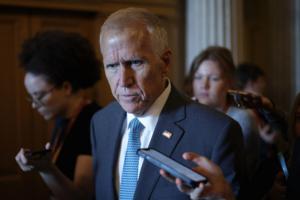
Mary Ellen Klas: Thom Tillis knew what the GOP refused to hear
On Tuesday, Republican Senator Thom Tillis became one of only three GOP senators to cast a vote against President Donald Trump’s budget bill. Ultimately, his vote was mostly symbolic — the measure passed on a 51-50 vote, with Vice President JD Vance casting the tiebreaker.
But the vote has already had consequences for the two-term lawmaker ...Read more

POINT: We celebrate America's freedoms on the 4th of July, not Britain's
Fast on the heels of the recent “No Kings” protests against President Donald Trump comes an odd suggestion that Americans would be better off today if we had remained part of the British Empire — an empire whose titular head (drum roll, please) is King Charles III, the British monarch.
The fact that some Americans even think this way ...Read more

COUNTERPOINT: Forgive us, England; We shouldn't have won
It is time once again to celebrate the red, white and blue. Of course, by that, I mean the Union Jack, the flag of the United Kingdom.
Our rightful flag.
The American Revolution was successful only because the ledger looked ugly in London, and as a matter of pragmatism, the project had to end. And what a shame it is.
We’d be better under ...Read more

Commentary: This Independence Day, you're not as free as you think
There’s a lot to celebrate this Independence Day, as we mark the 249th anniversary of our national divorce from Great Britain and the abuses of King George III.
Yet under the flags and fireworks, the hotdogs and hamburgers, and the checkered tablecloths camouflaged in red, white, and blue, lies an uncomfortable, ironic truth: You're not as ...Read more
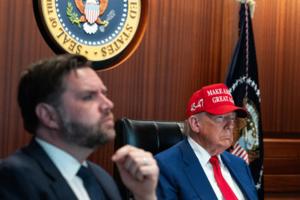
Commentary: What lessons are foreign leaders taking from Trump's Iran bombing
Asked during a White House news conference last week whether he would consider striking Iran again if the U.S. intelligence community found the country reassembling its nuclear program, President Donald Trump answered unequivocally: “Without question.”
Trump’s remarks were as ominous as the query posed to him, for it suggests that ...Read more

Editorial: A reminder in Africa that the religious freedoms we take for granted are fragile
As Christianity declines in the West, the faith is flourishing in sub-Saharan Africa, which is seeing the fastest growth in Christianity the world over. By 2060, more than 4 in 10 Christians worldwide are expected to live in sub-Saharan Africa, compared with just 1 in 10 in 1970, according to Pew Research.
But this growth is coming at a cost. ...Read more























































